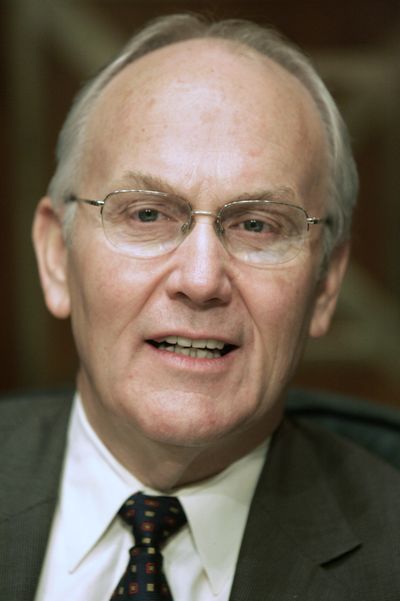Former Idaho Sen. Craig’s conduct returns to court
Judge looks at use of campaign funds

WASHINGTON – A federal judge this week will confront the surprisingly important fallout from former Idaho Republican Sen. Larry Craig’s 2007 bathroom arrest.
Craig’s own money may be on the line Wednesday, but that’s not all. Other politicians, too, could have a future stake in what U.S. District Judge Amy Berman Jackson says about how campaign dollars can be spent.
The Federal Election Commission says Craig improperly used more than $216,000 in campaign funds to pay attorneys after being charged with disorderly conduct for his behavior in a Minneapolis airport men’s room. Craig’s attorneys insist he was on official business and so could use his campaign treasury as other legally embattled lawmakers have done before him. The judicial resolution to this dispute could have a broad reach.
“It would certainly have application for any member of Congress, when they are trying to determine if they could use campaign funds for a legal defense,” Andrew D. Herman, one of Craig’s attorneys, said in an interview Monday.
Lawmakers have faced this question in the past in deciding whether to use campaign funds to defend themselves against misconduct accusations. Still, the oral argument set for Wednesday morning in a Washington, D.C., courtroom is the first face-to-face test for an FEC lawsuit filed against Craig last year. Until now, competing attorneys have fought each other through written filings.
Craig’s case arises from his arrest on June 11, 2007, at Minneapolis-St. Paul International Airport, while he was returning to Washington, D.C., from Idaho. An undercover police officer said he was sexually solicited in the men’s room by Craig.
Craig ultimately pleaded guilty to a misdemeanor charge of disorderly conduct but denied any sexual intentions. Craig retired at the end of 2008, concluding a congressional career that began in 1981.
Craig now is a principal in New West Strategies, a self-described “strategic advocacy” firm with offices in Washington, D.C., and Eagle, Idaho. The firm’s recent clients have included Murray Energy Co. and Western Pacific Timber, Senate lobbying records show.
Following his initial 2007 guilty admission, Craig hired two law firms in a failed effort to withdraw the politically embarrassing plea. Using campaign funds, he paid $139,352 to the Washington, D.C.-based firm Sutherland, Asbill & Brennan, and an additional $77,032 to the Minnesota-based firm Kelly & Jacobson.
The FEC concluded Craig violated the federal law that prohibits converting campaign funds to private use.
The Federal Election Commission unanimously approved filing the suit in a 5-0 vote in May 2012, after Craig rebuffed earlier efforts to resolve the issue administratively.
“Craig was arrested for purely personal conduct unrelated to his duties as a federal officeholder,” FEC attorneys argued in a legal brief, adding that “nothing about his official duties caused him to engage in that personal conduct in the airport restroom, or to subsequently plead guilty, or to thereafter try to withdraw that guilty plea.”
Craig’s attorneys, in their own legal briefs, counter that Craig was “engaged in official, Senate-sponsored travel” at the time of his arrest. While stressing that “they do not claim that using a restroom while traveling is strictly ‘official’ conduct,” the defense attorneys insist that the arrest and subsequent litigation “directly implicated” his public office.
It’s not uncommon for lawmakers to spend campaign funds on legal defense.
Former Democratic California Rep. Gary Condit, for one, used more than $100,000 in campaign funds for attorneys during a 2001 police investigation into missing intern Chandra Levy. New York Democratic Rep. Charles Rangel used more than $300,000 from his political action committee to pay attorneys during a 2009-2010 House ethics investigation. Former Florida Republican Rep. Tom Feeney used more than $100,000 in campaign funds to pay attorneys during a 2007 ethics investigation.
And, in a 2007 advisory opinion with some parallels to Craig’s case, the Federal Election Commission concluded that former Arizona Republican Rep. Jim Kolbe could use campaign funds to pay attorneys as he faced investigations. The House ethics committee and Justice Department inquiries dealt in part with Kolbe’s alleged behavior with male House pages during a 1996 Grand Canyon trip.
“We are not asking for anything the FEC hasn’t granted before,” said Herman, Craig’s attorney.
The judge is not expected to rule immediately Wednesday.